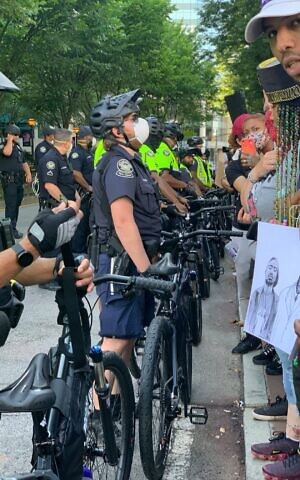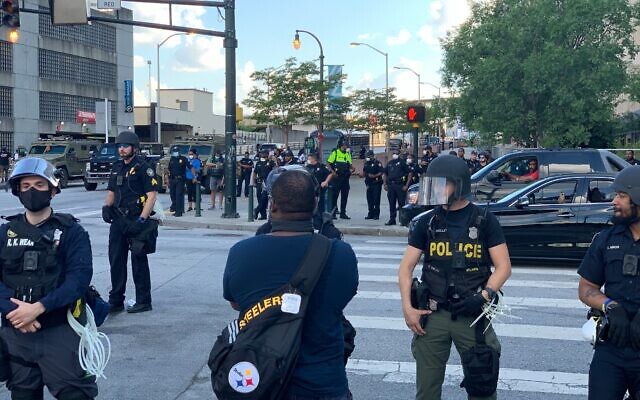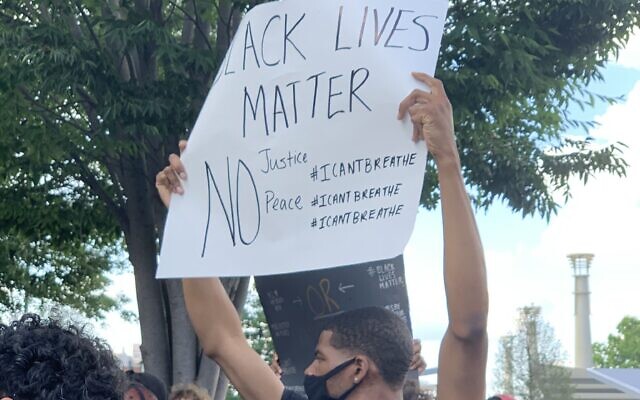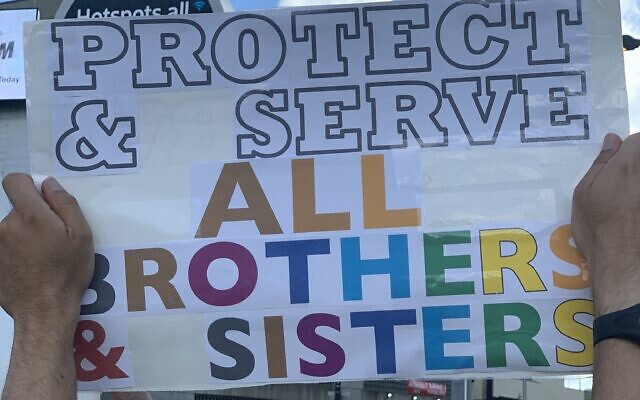Rabbi Practices What He Preaches
Temple Sinai spiritual leader protested a broken system, including a “provocative” exertion of power by the police at weekend rally.
This past weekend I had the privilege of standing up for my beliefs. I heeded the call to join in the protests taking place in the heart of my city and assembled with thousands of others to confront oppression. Though my own comfort level with social activism has evolved over the years, I have always believed that when our neighbors cry, we should cry with them. When our friends are in pain, we approach and hold them close. When our loved ones feel alone, we show up and say with our presence, “You are not alone, and I am here with you.”
I came to Atlanta as a rabbi seeking to live my principles and to work for a time when inequity is no more. Over the years, I have come to understand that, while there is much about our country that I most certainly love, we are living in a system that is most certainly broken. And I do not believe that I can pray for peace on Shabbat morning and work for it in the afternoon by binge watching Netflix, tempting as that may be. As I have preached and as I have taught, perhaps, just perhaps, God put us here on earth to be the answer to the prayers of others.
My friends, the prayers are there, should we allow ourselves to listen. They are there in the tears shed over yet another black man murdered by the police. They are there in the voices crying for justice, realizing that without justice, there can be no peace. The prayers are there in the multi-generational gatherings across the country where people are shouting for change (I just wish there were more people there who looked like me). The prayers are there in the pleas that have become the slogans of a new (but not so new) movement: I can’t breathe. I can’t breathe. I can’t breathe.
Our brothers and sisters are praying. And crying. And bleeding. And dying. And that means that we are as well, for we are a part of the same system, the same country, and the same humanity.

I went this past weekend to stand on the front lines because I couldn’t look at the words of our prayerbook and the words of our Torah the same had I chosen not to go. And as I heard the voices of my friends and read their posts on Facebook and spoke on the phone, I came to realize that my place was not at home but rather was standing together on the front lines. As I stood, a part of a peaceful protest, I watched what happened from the front lines as the police formed rows and then columns, moving all peaceful protesters from several spots into one central location. And then they got closer and barricaded us in. And then the SWAT team showed up. And then the drones. And it was scary. And it was provocative. And it was wrong.
To their credit, the police were restrained. They took the verbal abuse from the crowd in stride. But the system that emerged in plain view was one of containment, of power, of order. They had – and have – the power and ability to diffuse the situation but instead chose to incite.

The system, friends, is broken. And the fight is raging around us. And at this point, silence is complicity. Please, wherever you are, in whatever city you live, please try to do a few things:
1. Reach out to your friends of color. They are hurting. They are bleeding. They need you to check in, to listen, hell, even just to tell them that you are aware of their pain.
2. Stand up. Go to the front lines. Lock arms or do so with a bit of distance. If you don’t know where the protest is taking place tomorrow, look at where it took place today. And don’t worry about the timing – show up. And if you have to wait a bit, wait. Watch. Listen. Engage with those who are lingering in those spots. Hear the stories. Receive the pain.
3. Recognize the privileges you bring to the conversation and use them. This is the time for a privilege check, and it’s time to bring the tools in our toolbox, whether it is contacts you have, or bottles of water, or the color of your skin, or your cultural narrative, or your religious identity, or your … bring it. Bring it all. Use it all.

But most of all, just show up. Live the words we read on Shabbat and each and every day. Then will our prayers be answered. May that day come speedily and soon.
Rabbi Brad Levenberg is one of the spiritual leaders of Temple Sinai.




comments